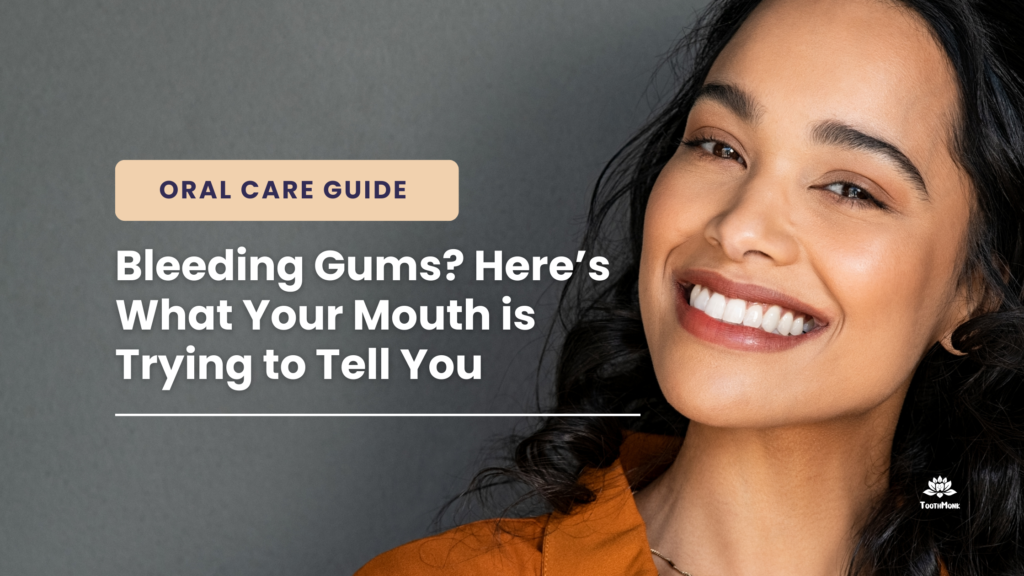
Imagine waking up one morning and seeing red stains on your toothbrush. At first, you ignore it, thinking it’s nothing serious. Days turn into weeks, and now your gums are swollen, tender, and bleeding even when you eat. What was once a minor issue has become painful and alarming. A visit to the dentist confirms advanced gum disease, and the treatment is costly and extensive. If only you had taken those early signs seriously! Let this be a wake-up call, your gums are trying to tell you something. Listen to them before it’s too late. Healthy gums lead to a healthier you!
Stay proactive about your gum health and keep smiling!
Bleeding gums are one of the most common oral health concerns, but they should never be ignored. While occasional bleeding might seem harmless, it can often be a sign of underlying dental or systemic issues. Your gums serve as an early warning system for your oral and overall health, and understanding the causes can help you take proactive steps toward prevention and treatment.
Why Do Gums Bleed?
Gums bleed due to various reasons, ranging from poor oral hygiene to systemic conditions. Identifying the cause is essential for effective treatment. Below are some of the most common reasons:
1. Gingivitis: The First Stage of Gum Disease
Plaque buildup along the gumline irritates the gums, leading to inflammation, redness, swelling, and bleeding. Often painless, gingivitis is reversible with proper oral hygiene and professional dental care. Left untreated, it can progress to periodontitis, causing severe gum damage and even tooth loss.
2. Periodontitis: The Advanced Stage of Gum Disease
If gingivitis worsens, it leads to periodontitis, where the gums pull away from the teeth, forming pockets that harbor bacteria. Symptoms include persistent bad breath, gum recession, and loose teeth. Treatment requires professional deep cleaning (scaling and root planing) and, in severe cases, surgical intervention.
3. Brushing or Flossing Too Hard
Using a hard-bristled toothbrush or aggressive brushing can damage gum tissue, leading to bleeding. Switching to a soft-bristled brush and using gentle circular motions can prevent irritation.
4. Poor Flossing Technique
If you just started flossing or floss irregularly, your gums may bleed due to sudden irritation. Regular, gentle flossing will help strengthen gum health and stop the bleeding over time.
5. Vitamin Deficiencies
Vitamin C deficiency (Scurvy): Causes weak, inflamed gums that bleed easily.
Vitamin K deficiency: Affects blood clotting, increasing gum bleeding.
Eating a diet rich in citrus fruits, leafy greens, and dairy products can help maintain healthy gums.
6. Hormonal Changes (Pregnancy & Menopause)
Pregnancy hormones can cause pregnancy gingivitis, making gums more sensitive and prone to bleeding.
Menopausal hormonal fluctuations can lead to dry mouth and increased gum sensitivity.
7. Medications That Increase Bleeding Risk
Blood thinners like aspirin, warfarin, and heparin can cause excessive gum bleeding.
Some high blood pressure and seizure medications lead to gum overgrowth, making them more prone to bleeding.
If gum bleeding is persistent, consult your doctor to discuss medication alternatives.
8. Smoking & Tobacco Use
Smoking weakens the immune system, reducing the body’s ability to fight gum infections.
It also causes gum discoloration, delayed healing, and chronic gum disease.
Quitting smoking can significantly improve gum health.
9. Diabetes & Other Systemic Diseases
Diabetes increases the risk of gum infections due to high blood sugar levels that promote bacterial growth.
Other conditions like leukemia, hemophilia, and immune disorders can also contribute to gum bleeding.
Managing overall health conditions can help improve gum health.
How to Stop & Prevent Gum Bleeding
1. Improve Your Oral Hygiene Routine
Brush twice daily with fluoride toothpaste and a soft-bristled toothbrush. Floss daily to remove plaque buildup between teeth. Use an antiseptic mouthwash (chlorhexidine or hydrogen peroxide-based) to kill bacteria.
2. Schedule Regular Dental Visits
Professional cleanings remove plaque and tartar that at-home care can’t eliminate.
Early detection of gum disease prevents serious complications.
3. Eat a Gum-Healthy Diet
Increase vitamin C & K intake (citrus fruits, spinach, and dairy).
Drink plenty of water to stimulate saliva production and wash away bacteria.
Limit sugary foods and acidic drinks to prevent plaque buildup.
4. Quit Smoking & Reduce Alcohol Consumption
Smoking cessation improves gum healing and reduces disease risk.
Reducing alcohol intake prevents dehydration, which can cause dry mouth and irritation.
5. Manage Underlying Health Conditions
If you have diabetes or take blood thinners, work closely with your doctor to manage gum health.
Control stress levels, as stress weakens the immune response to infections.
When to See a Dentist
See a dentist if:
- Gum bleeding persists despite improving oral hygiene.
- You experience swollen, red, or receding gums.
- There is persistent bad breath or pus formation.
- Your teeth feel loose or shifting.
Bleeding gums are your body’s way of signaling an underlying issue. Whether it’s gum disease, improper brushing, or a systemic condition, addressing the cause early can prevent serious complications. By following a consistent oral care routine, eating a nutrient-rich diet, and visiting the dentist regularly, you can maintain healthy gums and a bright smile.
